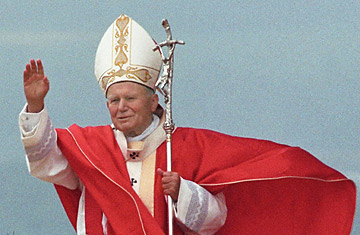
Pope John Paul II waves to a crowd in Gniezno, Poland, during a visit to his native country in 1997
(4 of 8)
The Pope obviously entertained high ambitions for the meeting as an example to the world of the healing powers of forgiveness. But the act of forgiveness is extraordinarily complex. It becomes especially intricate when the spirit of forgiveness is urged as a basis for public policy. John Paul's gesture proclaimed a larger exemplary message to the world. Is forgiveness a purely personal transaction, or can it be applied in a political way to reconcile enemies? What if Israeli Prime Minister Yitzhak Shamir and Palestine Liberation Organization Chairman Yasser Arafat forgave each other and came to some reconciliation, perhaps in the way Shamir's predecessor, Menachem Begin, and Egyptian President Anwar Sadat did in 1977 when Sadat made his dramatic journey to Jerusalem? If John Paul could forgive the man who shot him, could sit with him and hold his hands, could not Ronald Reagan and Soviet Leader Yuri Andropov have dinner some time? John Paul seemed to be suggesting that such acts could at least dampen some of the more murderous impulses that are loose in places like Lebanon and El Salvador. Is there a larger public and political application of John Paul's example?
The first complexity of forgiveness involves the question of justice. Personal or even divine magnanimity is not public justice, and it should not be permitted to override justice. The Pope forgave Agca, but Agca remains in jail, and should. President Gerald Ford did not seem to have the distinction clear in his mind when, using somewhat sacramental language, he pardoned Richard Nixon in 1974. Said Ford: "I do believe, with all my heart and mind and spirit, that I, not as President, but as a humble servant of God, will receive justice without mercy if I fail to show mercy."
It was one thing for Ford, as a human being, to forgive Nixon, but another for Ford, as President of the U.S., to grant a pardon, thus short-circuiting the judicial process. Says Father Robert Friday, professor of religion and religious education at the Catholic University of America: "Forgiveness doesn't mean that you become some sort of a wimp and forgive without some kind of demand. We are responsible for what we have done." Jesuit Theologian Avery Dulles agrees: "For the ordering of society, there should still be justice. Restraint and punishment are necessary even for forgiveness."
In public realms, there is very often a tension between justice and forgiveness. The Rev. Roger Shinn, professor of social ethics at New York City's Union Theological Seminary, emphasizes the difference between personal forgiveness and legal or social forgiveness. "Personal relations can be very spontaneous, almost oblivious to rules, to law and order," says he. "Society cannot be. That is the whole problem of Christian political ethics, how to translate the ultimate virtue of love into a social order that has stability, consistency."
